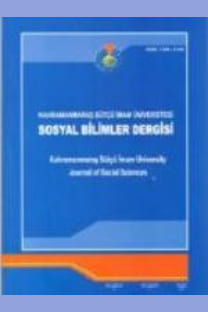Türkiye’de Sektörel Düzeyde Çalışma Sermayesi Unsurları ile Finansal Performans Arasındaki Etkileşim
Interaction between Working Capital Components and Financial Performance at Sectoral Level in Turkey
___
- Akgüç, Öztin (1998), Finansal Yönetim, Avcıol Basım Yayın, Yenilenmiş 7. Baskı, İstanbul.
- Aksoy, Ahmet ve Yalçıner, Kürşat (2013), ĠĢletme Sermayesi Yönetimi, Detay Yayıncılık, Gözden Geçirilmiş ve Yenilenmiş 5. Baskı, Ankâra.
- Asaduzzaman, Md. and Chowdhury, Tabassum (2014), “Effect of Working Capital Management on Firm Profitability: Empirical Evidence from Textiles Industry of Bangladesh”, Research Journal of Finance and Accounting, Vol. 5, No: 8, pp. 175-184.
- Atmaca, Metin (2016), “Finansal Oranlar Aracılığıyla Çalışma Sermayesi Bileşenlerinin Kârlılığa Etkisi: Borsa Ġstanbul’da ĠĢlem Gören Kimya, Plastik ve Kauçuk ġirketlerinde Bir AraĢtırma”, Yönetim Bilimleri Dergisi, Cilt: 14, Sayı: 28, ss. 633-649.
- Aygün, Mehmet (2012), “Firma Performansı Üzerinde ÇalıĢma Sermayesinin Etkisi: Türk Ġmalat Sektörü Üzerine Bir Uygulama”, Ege Akademik Bakış, Cilt: 12, Sayı: 2, ss. 215-223.
- Aytekin, Sinan ve Güler, Sevinç (2014), “Nakit Dönüş Süresi ve Kârlılık Arasındaki İlişkinin Belirlenmesi: BIST TaĢ ve Toprağa Dayalı Sanayi Endeksi’nde (XTAST) Ampirik Bir Uygulama”, Kafkas Üniversitesi İktisadi ve İdari Bilimler Fakültesi Dergisi, Cilt: 5, Sayı: 8, ss. 79-98.
- Brealey, Richard A., Myers, Stewart C. ve Marcus, Alan J. (2007), ĠĢletme Finansının Temelleri (Çev. Ünal Bozkurt, Türkân Arıkan ve Hatice Doğukanlı), Literatür Yayıncılık, Beşinci Basım, İstanbul.
- Büyükşalvarcı, Ahmet ve Abdioğlu, Hasan (2010), “Kriz Öncesi ve Kriz Dönemlerinde ĠĢletmelerde ÇalıĢma Sermayesi Gereksiniminin Belirleyicileri: ĠMKB Ġmalat Sanayi ġirketleri Üzerine Ampirik Bir Uygulama”, Atatürk Üniversitesi İktisadi ve İdari Bilimler Dergisi, Cilt: 24, Sayı: 2, ss. 47-71.
- Coşkun, Ender ve Kök, Dündar (2011), “ÇalıĢma Sermayesi Politikalarının Kârlılık Üzerine Etkisi: Dinamik Panel Uygulaması”, Ege Akademik Bakış, Cilt: 11, NO: Özel Sayı, ss. 75-85. Çabuk, Adem ve Lazol, İbrahim (2016), Mali Tablolar Analizi, Ekin Basım Yayın Dağıtım, 15. Baskı, Bursa
- Deloof, Marc (2003), “Does Working Capital Management Affect Profitability of Belgian Firms?”, Journal of Business, Finance & Accounting, Vol. 30, NO: 3&4, pp. 573-587.
- Dursun, Adem ve Ayrıçay, Yücel (2012), “ÇalıĢma Sermayesi-Kârlılık İlişkisinin ĠMKB Örneğinde 1996-2005 Dönemi Analizi”, Atatürk Üniversitesi İktisadi ve İdari Bilimler Dergisi, Cilt: 26, Sayı: 3-4, ss. 199-214.
- Elmas, Bekir (2016), Finansal Tablolar Analizi, Nobel Yayın, Geliştirilmiş ve Gözden Geçirilmiş 2. Basım, Ankâra.
- Gholizadeh Khajeh, Sajjad (2014), BİST Tekstil, Deri Sektöründeki Firmalarda ÇalıĢma Sermayesi Yönetiminin Firma Kârlılığı Üzerine Etkileri, Yayımlanmamış Yüksek Lisans Tezi, Atatürk Üniversitesi, Sosyal Bilimler Enstitüsü, Erzurum.
- Gürsoy, Cudi Tuncer (2012), Finansal Yönetim Ġlkeleri, Beta Basım, 2. Baskı, İstanbul.
- Keskin, Rıdvan ve Gökalp, Füsun (2016), “ÇalıĢma Sermaye Yönetiminin Firma Kârlılığı Üzerine Etkisi: Panel Veri Analizi”, Doğuş Üniversitesi Dergisi, Cilt: 17, Sayı: 1, ss. 15-25.
- Lazaridis, Ioannis and Tryfonidis, Dimitrios (2006), “Relationship Between Working Capital Management and Profitability of Listed Companies in the Athens Stock Exchange”, Journal of Financial Management and Analysis, Vol. 19, No: 1, pp. 1-12.
- Makori, Daniel Mogaka and Jagongo, Ambrose (2013), “Working Capital Management and Firm Profitability: Empirical Evidence from Manufacturing and Construction Firms Listed on Nairobi Securities Exchange”, Kenya, International Journal of Accounting and Taxation, Vol. 1, No: 1, pp. 1-14.
- Mathuva, David M. (2010), “The Infuence of Working Capital Management Components on Corporate Profitability: A Survey on Kenyan Listed Firms”, Research Journal of Business Management, Vol. 4, No: 1, pp. 1-11.
- Meder Çakır, Hafize (2013), “Nakit Döngüsünün Firma Kârlılığına Etkisinin Sektörel Analizi”, Journal of Yasar University, Cilt: 30, Sayı: 8, ss. 4948-4965.
- Mohamud, Fuaad Ahmed (2016), ÇalıĢma Sermayesi Yönetiminin ĠĢletme Kârlılığı Üzerine Etkileri: BİST’de Kayıtlı ĠĢletmeler Üzerinde Bir Araştırma, Yayımlanmamış Yüksek Lisans Tezi, Kocaeli Üniversitesi, Sosyal Bilimler Enstitüsü, Kocaeli.
- Napompech, Kulkanya (2012), “Effects of Working Capital Management on the Profitability of Thai Listed Firms”, International Journal of Trade, Economics and Finance, Vol.3, No: 3, pp. 227-232.
- Sarıaslan, Halil ve Erol, Cengiz (2014), Finansal Yönetim, Kavramlar, Kurumlar ve Ġlkeler, Siyasal Kitabevi, Gözden Geçirilmiş 2. Baskı, Ankara.
- Şahin, Osman (2011), “ĠMKB’ye Kayıtlı Ġmalat ġirketlerinde ÇalıĢma Sermayesi Politikaları ve Firma Performansı ĠliĢkileri”, Eskişehir Osmangazi Üniversitesi İİBF Dergisi, Cilt: 6, Sayı: 2, ss. 123-141.
- Uchenna, Ani Wilson, Okwo, Ifeoma Mary and Ugwunta, David Okelue (2012), “Effects of Working Capital Management on Profitability: Evidence from the Top five Beer Brewery Firms in the World”, Asian Economic and Financial Review, Vol.2, No: 8, pp. 966-982.
- Yıldız, Birol ve Akkoç, Soner (2016), “Çalışma Sermayesi ve Kârlılık İlişkisinin Keşifsel Bir Araçla (ANFIS) İncelenmesi”, Eskişehir Osmangazi Üniversitesi İİBF Dergisi, Cilt: 11, Sayı:1, ss. 285-308.
- ISSN: 1304-8120
- Yayın Aralığı: Yılda 3 Sayı
- Başlangıç: 2004
- Yayıncı: Kahramanmaraş Sütçü İmam Universitesi
Yeni Kimlik Tanımlamaları Ve Avrupa Gerçekliği
İslam Hukukunda Rükün Ve Şartın Tayininin Fıkhî İhtilaflara Etkisi
İslam Hukuku Bağlamında Organ Naklinde Çözüme Açık Alanlar
Türkiye’de Sektörel Düzeyde Çalışma Sermayesi Unsurları ile Performans Arasındaki Etkileşim
Muhammed Mustafa Kısakürek, Adem Babacan, Merve Tuncay
Banu GÜLER, Selda BAŞARAN ALAGÖZ
İslam Hukuku Açısından Organ Naklinde Tartışmaya Açık Alanlar
Üniversite Öğrencilerinin Etik Değerlere Yatkınlık Durumları Ve İlişkili Faktörler
Ortaokul Öğrencilerinin Fen Öğrenmeye Yönelik Motivasyonlarının İncelenmesi
Ferhat KARAKAYA, Mehmet YILMAZ, Sakine Serap AVGIN
Sadegül DURGUN, Ahmet Hamdi AYDIN
Ortaokul Öğrencilerinin Fen Bilimleri Öğrenmeye Yönelik Motivasyonlarının İncelenmesi
